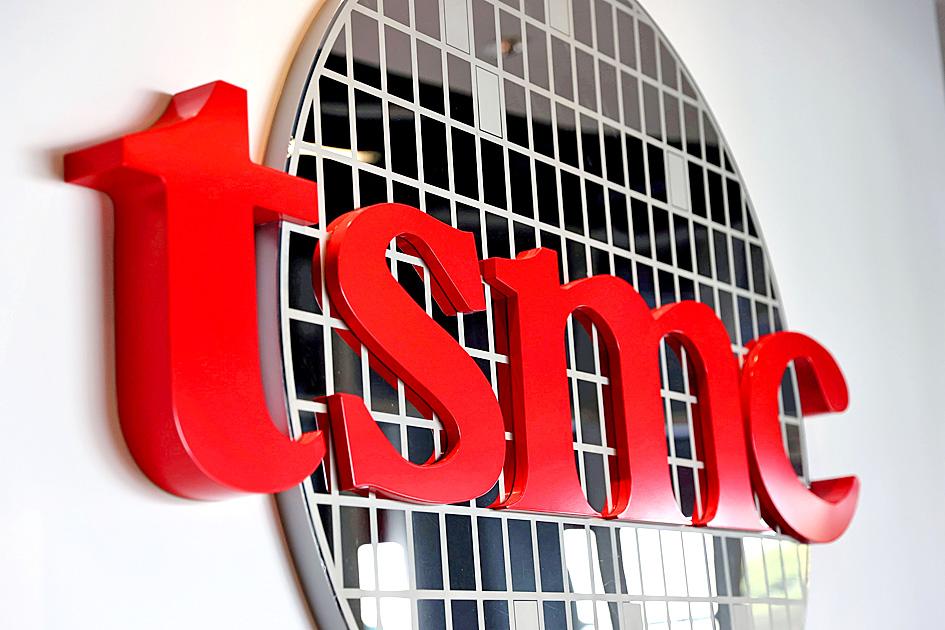Taiwan Semiconductor Manufacturing Co (TSMC, 台積電), the world’s top chipmaker, would not give the US Department of Commerce confidential customer information, majority stakeholder the National Development Fund (國發基金) said yesterday.
National Development Council (NDC) Minister Kung Ming-hsin (龔明鑫), who oversees the fund and is a TSMC board director, told legislators at the Legislative Yuan in Taipei that although the chipmaker could provide the industry more insight into chip shortages during its quarterly board meeting, it is bound by confidentiality agreements not to disclose sensitive details.
US Secretary of Commerce Gina Raimondo on Thursday last week said that her agency was asking chip suppliers to fill out questionnaires by Nov. 8 to help it alleviate chip supply bottlenecks and identify possible hoarding.

Photo: Reuters
Legislators were seeking to know if TSMC could be forced by the US to surrender confidential information, such as a customer list, chip inventory and production plans, which would compromise its technology and business.
Kung said he would seek to better understand the situation before forming an opinion on the nature of the US’ requests.
The council later released a statement saying that the requests are aimed at all companies in the semiconductor supply chain, not just TSMC, and that response is voluntary.
Companies can decide whether the questions encroach on confidential agreements, the council said, adding that TSMC has indicated it would not reveal any commercial secrets.
TSMC said the government has been supporting the company, adding that it would seek additional government help if needed.
As the world’s No. 1 pure foundry service provider, TSMC makes chips and builds capacity according to customers’ demands, meaning that it does not stack inventory.
To alleviate global chip shortages, TSMC said it has taken “unprecedented actions to address this challenge.”
The chipmaker has increased output of microcontroller units — key components in automotive semiconductor products — by 60 percent from last year, it said.
The company made the remarks after participating in a White House meeting last week aimed at tackling chip crunch.
“Increasing demand visibility in this complex supply chain should be the path to avoid such shortages from happening,” the company said.
The chipmaker also said it is confident that its capacity expansion plan including an advanced 5-nanometer semiconductor fab in Phoenix, Arizona, would enable it to support the industry in driving long-term stability in semiconductor supplies.

POWERING UP: PSUs for AI servers made up about 50% of Delta’s total server PSU revenue during the first three quarters of last year, the company said Power supply and electronic components maker Delta Electronics Inc (台達電) reported record-high revenue of NT$161.61 billion (US$5.11 billion) for last quarter and said it remains positive about this quarter. Last quarter’s figure was up 7.6 percent from the previous quarter and 41.51 percent higher than a year earlier, and largely in line with Yuanta Securities Investment Consulting Co’s (元大投顧) forecast of NT$160 billion. Delta’s annual revenue last year rose 31.76 percent year-on-year to NT$554.89 billion, also a record high for the company. Its strong performance reflected continued demand for high-performance power solutions and advanced liquid-cooling products used in artificial intelligence (AI) data centers,

SIZE MATTERS: TSMC started phasing out 8-inch wafer production last year, while Samsung is more aggressively retiring 8-inch capacity, TrendForce said Chipmakers are expected to raise prices of 8-inch wafers by up to 20 percent this year on concern over supply constraints as major contract chipmakers Taiwan Semiconductor Manufacturing Co (TSMC, 台積電) and Samsung Electronics Co gradually retire less advanced wafer capacity, TrendForce Corp (集邦科技) said yesterday. It is the first significant across-the-board price hike since a global semiconductor correction in 2023, the Taipei-based market researcher said in a report. Global 8-inch wafer capacity slid 0.3 percent year-on-year last year, although 8-inch wafer prices still hovered at relatively stable levels throughout the year, TrendForce said. The downward trend is expected to continue this year,

A proposed billionaires’ tax in California has ignited a political uproar in Silicon Valley, with tech titans threatening to leave the state while California Governor Gavin Newsom of the Democratic Party maneuvers to defeat a levy that he fears would lead to an exodus of wealth. A technology mecca, California has more billionaires than any other US state — a few hundred, by some estimates. About half its personal income tax revenue, a financial backbone in the nearly US$350 billion budget, comes from the top 1 percent of earners. A large healthcare union is attempting to place a proposal before

Vincent Wei led fellow Singaporean farmers around an empty Malaysian plot, laying out plans for a greenhouse and rows of leafy vegetables. What he pitched was not just space for crops, but a lifeline for growers struggling to make ends meet in a city-state with high prices and little vacant land. The future agriculture hub is part of a joint special economic zone launched last year by the two neighbors, expected to cost US$123 million and produce 10,000 tonnes of fresh produce annually. It is attracting Singaporean farmers with promises of cheaper land, labor and energy just over the border.